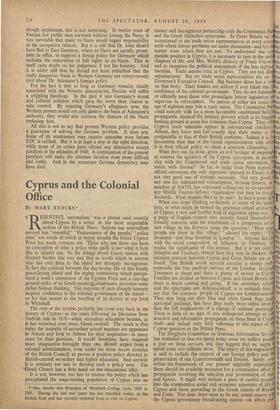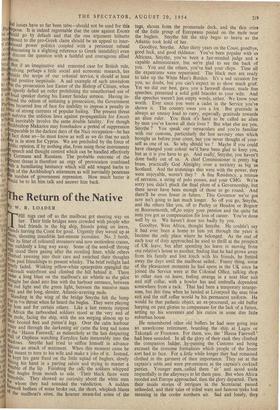Cyprus and the Colonial Office
By MARY STOCKS* 6 RESENTFUL nationalism' was a phrase used recently about Cyprus by a writer in the most respectable section of the British Press. Seldom has nationalism seemed less ' resentful." Enslavement of the people, ' police state,' are words of which in recent months the Greek Cypriot Press has made constant use. Those who use them can have no conception of what a police state really is nor what it feels like to inhabit one. So the debate about Enosis (union with Greece) hurtles this way and that in words which to anyone who has ever been to the island are strangely incongruous. In fact the contrast between the day-to-day life of this kindly peace-loving island and the raging controversy which precipi- tated a week's suspension of the Cypriot Press and a one-day general strike of its Greek-speaking, inhabitants, provokes some rather furious thinking. The outcome of such thought scarcely inspires confidence in the colonial government of the island— or for that matter in the handling of its destiny at top level in Whitehall.
The root of the trouble probably lies some way back in the history of Cyprus—in the years following its liberation from Turkish rule in 1878—when secondary education became, as it has remained ever since, Greek-centred. The result is that today the majority of secondary school teachers are appointed in Athens and look to Athens for their inspiration—in many eases for their pensions. It would doubtless have required more imaginative foresight than one should expect from a colonial administration, even under the more recent stimulus of the British Council, to pursue a positive policy directed to British-centred secondary and higher education. And anyway it is certainly too late to develop such a policy now. The tGreek Church has a firm hand on the educational tiller.
It is not, however, too late to reverse the policy which has precipitated the wage-earning population of Cyprus into an
* Mrs. Stocks was Principal of Westfield College from 1939 to 1951. During the last two years she has travelled widely in the Middle East and has recently returned from a visit to Cyprus.
uneasy and incongruous partnership with the Communist Pa rp and the Greek Orthodox episcopate. In Great Britain we ou accustomed to see trade union representatives at every cou po table where labour problems are under discussion—and for t tic matter even where they are not. To understand the co uln parable position in Cyprus, it is necessary to turn to the earl d, chapters of Mr. and Mrs. Webb's History of Trade Unioni tic and to recapture the political atmosphere of the late eightc Et twenties. Trade unions exist in Cyprus. They are not ille vol organisations. But no trade union representative sits on t is Governor's Executive Council. Big business alone has a vol oi■ on that body. Their leaders are seldom if ever taken into t as confidence of the colonial government. They do not habitua or officially meet those who promulgate labour legislation all to supervise its enforcement. No person of either sex under t urn age of eighteen may join a trade union. The Communist Pad en could scarcely wish for a more favourably conditioned field f ace propaganda, shortrof the primary poverty which is its happie' e hunting ground in areas less fortunate than Cyprus. Thus why Cypriot trade unionists appear in international conclave tel Athens, they know and feel acutely that their status is m comparable to that of their British confreres. Indeed it is 'e favourable than that of the Greek representatives with who' e it is their official policy to claim a common citizenship. ub' What then can be done, given an evil heritage of ineptitud I s to counter the agitation of. the Cyprus episcopate, in panne y ship with the Communist and trade union movements. f' e$ union, with Greece? So far, to judge from Press reports official utterances, the only argument opposed to Enosis is t ci not very good one of strategic necessity. Not very good. e any rate for international consumption, because Greece, as. Member of NATO, has expressed willingness to co-operate any Middle Eastern defence organisation that may be tholl desirable. What remains then to be said?. In fact a great d When one stops thinking exclusively in terms of the episc. pate, or what might be termed the grammar-school aristocrat of Cyprus, a new and fruitful field of argument opens out. T a party of English visitors who recently found themselves friendly converse with the inhabitants of a prosperous nirJ tain village in the Kyrenia range the question: How man people are there in this village? ' elicited the reply : ' 1 thousand—and four hundred in London' ! Anyone fa nil with the social composition of Islington or Finsbury w realise the significance of this answer. But it is not only Islington and Finsbury, though here they may lie thickest. th intimate contacts between Cyprus and Great Britain are to found. The British social services exercise a strong pull -especially the free medical service of the. London hospita Transport is cheap and there is plenty of money in Cyr Families are divided as-between Cyprus and Great Britain a there is much coming and going. If the secondary sch and the episcopate are Athens-centred, it is certainly true say that the common people of Cyprus are London-cent They may hang out their blue and white Greek flags tin episcopal guidance, but have they really been called upon face the full implications of a change of national parent age There is little or no sign of any widespread attempt at co structive and informative propaganda on these lines in Cyp itself—and indeed very little reference to this aspect of t Cyprus question in the British Press. The Drogheda Committee on Overseas Information Servt has reminded us that ,we spend today some ten million you a year on these services, and they suggest that we ought spend some two millions more. The object of this expenditu is said to include the support of our foreign policy and t preservation of our Commonwealth and Empire. Surely, e within the framework of our present niggardly expenditu there should be available resources for a constructive effort propaganda involving the selection and presentation of fat and figures. It might well include a piece of careful researe into the comparative social and economic amenities of life 1 Cyprus and those prevailing in the Greek islands of R hod and Crete. Nor does there seem to be any sound reason wh, the Cyprus government broadcasting system—on which poll' 1 issues have so far been tabu—should not be used for this !Pose. It is indeed regrettable that the case against Enosis uld go by default and that the one argument hitherto Posed to the pro-Greek claim should be an appeal to inter- ti nal power politics coupled with a persistent refusal urinating in a slighting reference to Greek instability) even scuss the question with a faithful and courageous allied n.
It if an imaginative and reasoned case for British rule, ving perhaps a little social and economic research, lies de the scope of our colonial service, it should at least I positive ineptitude. A sad example of such unwisdom the prosecution last Easter of the Bishop orCitium, when penly defied an order prohibiting the unauthorised use of id speaker during his Easter Sunday sermon. Having in- :c1 the odium of initiating a prosecution, the Government incurred loss of face for inability to impose a penalty in ace of strong currents of popular feeling. The present threat enforce the sedition laws against propagandists for Enosis ill inevitably involve the same double fatality. For though rchbishop Makarios may foreshadow a period of suppression °at parable to the darkest days of the Nazi occupation—he has ti fact done so—he must know as well as we do that no such ate is in store for Cyprus. We are precluded by the force of Ublic opinion, if by nothing else, from using those instruments speech and thought control which can be handled effectively Y Germans and Russians. The probable outcome of the resent threat is therefore an orgy of provocation combined ith a humiliating hesitancy which will add winged barbs to uch of the Archbishop's utterances as will inevitably penetrate e meshes of government repression. How much better it 'ou[d be to let him talk and answer him back. tio



































 Previous page
Previous page